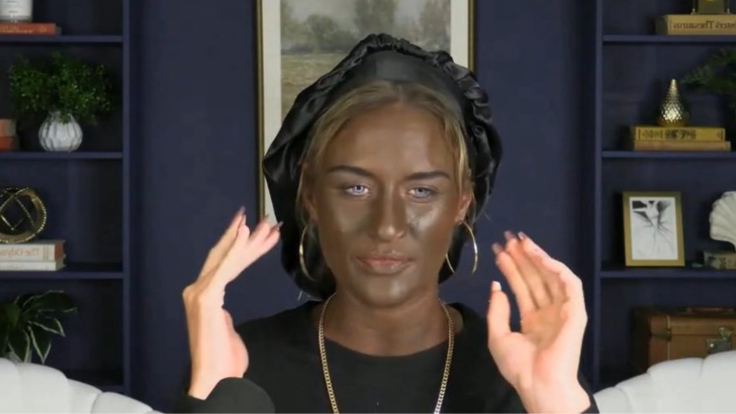
A prominent American social-media influencer, Lily Gaddis, is under intense scrutiny after posting a Halloween costume that critics are calling 'blackface' and racially insensitive, reviving a painful chapter of cultural appropriation and racism in visual form.
Gaddis, who bills herself as a 'trad-wife' lifestyle influencer, posted a video on TikTok featuring darkened skin makeup for a Halloween look, and she has since been denounced across social media platforms and by commentators as uncultured and racist.
On top of the costume controversy, her previous use of the N-word in a separate TikTok video led to her being fired from her job at the home-care company, Rophe of the Carolinas.
Costume Incident and Backlash
In the Halloween post, which has since been widely circulated and critiqued, Gaddis appears with heavily darkened skin and stylised features that many observers identify as blackface, a performative mimicry of Black identity with a long racist pedigree.
While Gaddis has not offered a full public apology, her video sparked outrage online, and numerous commentators described the look as tone-deaf, offensive, and culturally insensitive.
@broadcastwatchmedia Lilly Gaddis: The Blackface Outrage That Shocked the Internet Lilly Gaddis has become the latest figure in a disturbing online trend where individuals use racism as a form of self-promotion. Dressed in blackface and even performing a Hitler salute, Gaddis posted her “Halloween costume” online — a move that sparked widespread condemnation. Her video, which quickly went viral, symbolized how far some online personalities are willing to go for attention. Social media users expressed outrage, calling the act not just offensive but a deliberate attempt to provoke. Many questioned how such blatant racism can thrive in an environment with little to no moderation — particularly on platforms like X (formerly Twitter), where hate speech enforcement has plummeted. Commentators have pointed out that Gaddis’s performance goes beyond ignorance — it’s part of a larger culture of attention-seeking “shock content,” where the goal isn’t humor or satire, but engagement at any moral cost. As one user put it, “Blackface isn’t edgy. It’s desperation dressed as performance art.” This episode serves as a grim reminder that online fame often rewards outrage, not integrity. And in Gaddis’s case, the price of clicks was her credibility — if she ever had any to begin with. The Canary — November 2, 2025 #LillyGaddis #bwmpolitics #trending #fyp
♬ Nobody (feat. Athena Cage) - Keith Sweat
The backlash was swift. In another occasion, her earlier video wherein she casually used the N-word in reference to Black men, went viral, prompting her employer's statement that her 'statements do not align with the values and beliefs of the company'.
She responded defiantly on social media, saying that 'all the backlash made me do a deep dive and soul search, and after all that I still couldn't find a care'.
Gaddis's case comes at a time when social-media platforms are under growing pressure to hold influencers to account for racially insensitive or appropriative behaviour. Critics argue that her costume reproduces white-supremacist visual tropes and perpetuates centuries-old caricatures, underlining the need for greater cultural literacy in influencer circles.
Historical Roots of Blackface
The outrage surrounding Gaddis's costume is not simply about one outfit; it taps into a deep and troubling history of blackface in Western visual culture. Blackface, the practice whereby non-Black (usually white) performers darkened their skin with burnt cork, shoe polish, or greasepaint to portray caricatured versions of Black people, emerged in the United States in the early 19th century and became central to minstrelsy.
The genre's most infamous stage character, 'Thomas D. Rice' (born 1808), created the 'Jim Crow' persona in 1830, with exaggerated dialect, dancing, and buffoonery intended to mock African Americans.
These performances spread negative stereotypes, portraying Black people as lazy, ignorant, hyper-sexualized, or criminal, and were used to justify segregation and discrimination under 'Jim Crow' laws.
By the early 20th century, blackface had migrated into film and theatre. The 1915 film The Birth of a Nation featured white actors in blackface portraying freed slaves as rapacious and menacing, contributing to the resurgence of the Ku Klux Klan. With the civil rights movement of the 1950s and 60s, the practice declined in explicit form, yet its legacy persists.
Cultural Impact and Influencer Accountability
The Gaddis incident raises pressing questions about influencer culture, responsibility, and the boundaries of costume-based humour. Supporters of Gaddis may argue her look was intended as satire or homage, but many observers say context, power imbalance, and historical burden matter. When a white influencer dons blackface, the impact cannot be separated from centuries of racial trauma and caricature.
Industry observers note that influencer marketing is increasingly subject to reputational risk. Companies and platforms now monitor for culturally insensitive content, and the fallout from racist or appropriative acts can damage personal brand and partnerships. In Gaddis's case, she has already lost employment and faces broader reputational damage.
As the global audience becomes more racially literate and attuned to issues of representation, influencers who fail to engage with this context risk causing harm – intentional or not.







